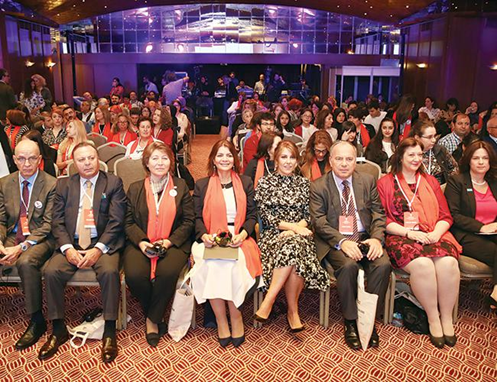Invest in girls’ education to change the world: Doğan Boyner
12.10.2017


Invest in the education of girls if you want to change the world, Hanzade Doğan Boyner, the president of Aydın Doğan Foundation, said yesterday, speaking at a conference held to mark the Oct. 11 International Day of the Girl Child.
“Our girls and women do not need support for empowerment. They are already powerful. What we need to do is to emphasize their strong points and abolish obstacles that prevent them from performing their powers,” Doğan Boyner said at the opening of the conference.
“An important role falls on the shoulder of women in finding solutions to the problems of the 21st century,” she said, adding that if a higher budget is reserved for the education of girls and more women are present in decision-making mechanisms then more efficient solutions could be produced to the world’s problems.
This year’s conference’s keynote speaker was Princess Nisreen El Hashemite, the director of the Royal Academy of Science International Trust (RASIT) and the president of Women in Science International League.
A scientist herself, El Hashemite underlined the importance of science in responding to future challenges and said it would be difficult to tackle with those challenges unless women and especially young female generations engage in science. As the number of women scientists still remains low, El Hashemite spoke about the need to increase the visibility of female scientists as role models, suggesting that TV series could do more to highlight the role of women in science, for example.
Female scientist who fell in love with Marie Curie’s husband
One of the highlights of the conference was the speech delivered by Canan Dağdeviren, a young Turkish female scientist who is on Forbes magazine’s 30 Under 30 in Science.
Dağdeviren, who joined the Massachusetts Institute of Technology’s (MIT) Media Lab in January 2017 to direct a research group, spoke about her career in science. Discovering her interest in science during childhood, Dağdeviren said her father gave her a book on the life of Marie Curie, the only woman to have won two Nobel prices in two different areas in science.
“He thought I would be impressed by Marie Curie but I fell in love with her husband,” she said, adding that this led her to study physics. “Apart from my mother, no one supported me. They said studying and building a career in physics would be difficult. But this year I received an invitation from MIT without even applying.”
Dağdeviren said she is committed to creating scientific awareness and meeting with young students as much as possible, stressing that “success is contagious.
“One of my biggest aims is to raise students who would resemble me,” said Dağdeviren, who communicates from the U.S. with thousands of students at various Turkish universities via Skype.
She also told the audience about her scientific works, particularly on the piezoelectric systems that she created which can be twisted, folded, stretched, wrapped, and implanted onto curvilinear surfaces of the human body without damage or significant alteration in device performance.
The conference was jointly organized by the Aydın Doğan Foundation, the U.N., the UNFPA, UNICEF, and U.N. Women.

